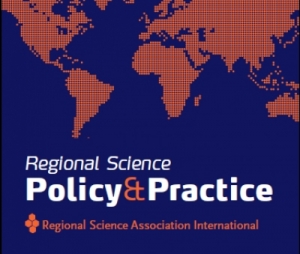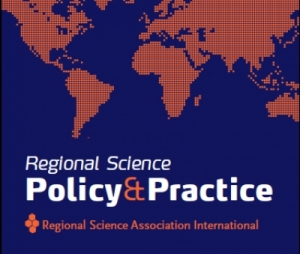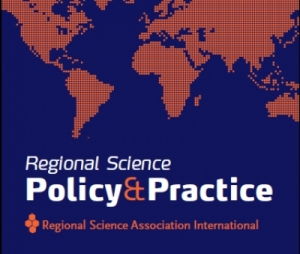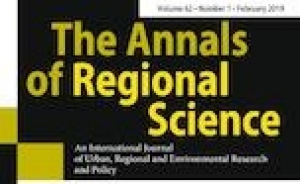Archives
Elisabete Martins
AESOP Newsletter 09/2019
|
|||||||||||||||||||||||
|
Post-doc position on the Economic Geography of Desertification
Dear Collegues,
at Bocconi GREEN (Centre for Geography, Resources, Environment, Energy and Networks) we have a post-doc position on the spatial economic and environmental impacts of desertification.
The post-doc researcher will be involved in the following 2-years programme:
"Climate change, soil vulnerability, biodiversity loss and growing anthropogenic pressure are putting the ecosystem of vast areas of Mediterranean countries at risk. The aim of the research project is to investigate a specific point of view of these threats, namely that of desertification and its interactions with the socio-economic system. In particular, the research will address how the vulnerability of soil to erosion and desertification phenomena is influenced not only by exogenous phenomena with respect to the location (for example, the rise of the seas as a result of global warming), but also by endogenous and local factors, and how this, in turn, influences the productivity of agricultural and manufacturing companies."
Further information can be found here:
Best regards,
Marco Percoco
Call for Papers | Regional Science and Tourism (NECTAR Special Session in PRSCO-WRSA-RSAI 2020)
Regional Science and Tourism (NECTAR Special Session in PRSCO-WRSA-RSAI 2020)
NECTAR Clusters 5-6 Special Session
Waikiki, Hawaii, March 18-21, 2020
Call for papers
As part of the 26th Pacific Conference of the RSAI, to be held jointly with the 59th Annual Meeting of the WRSA in Waikiki, Hawaii from March 18 to 21, 2020, Nectar clusters 5 and 6 are organizing a Special Session on “Regional Science and Tourism”.
The website for submission is now open (www.wrsaonline.org). Short abstracts as well as full papers (also in draft format) will be accepted for the Special Session. Full papers benefit from the traditional WRSA 45-minute per paper time slot. Submission deadline is November 15, 2019 for full length original papers (not previously published).
During your submission, do not forget to add that your paper is submitted for the Nectar Special Session on Regional Science and Tourism. Please, also send a copy of the submission to Juan Carlos Martin, University of Las Palmas de Gran Canaria, This email address is being protected from spambots. You need JavaScript enabled to view it. and Luca Zamparini, University of Salento, This email address is being protected from spambots. You need JavaScript enabled to view it..
Selected full papers will be invited for publication in a special issue of the Regional Science Policy & Practice Journal, following standard review/revision procedures.
(https://rsaiconnect.onlinelibrary.wiley.com/journal/17577802).
Main topic
Christaller (1964) was probably one of the first regional scientists who analysed, after the conference held in Lund during 1963, the patterns on geographical location of tourist activity. Christaller found that “It is typical for places of tourism to be on the periphery. In this way, regions economically benefit from factors which cannot be utilized otherwise: high mountain chains, barren, rocky landscapes, heather, unproductive dunes.” (p.86). Since then, the tourism industry has changed dramatically, and Regional Science as a discipline needs to analyse multiple strategies, policies and trends that are critical for tourist destinations that aspire to position and to consolidate their image in the world-wide network of tourist destinations at different geographical levels, urban or rural, within a framework of tough global competition. For this reason, potential topics discussed at the Special Session include:
- How can tourism studies benefit from Regional Science?
- Quantitative methods of Regional Science applied to Tourism
- Consumer Behavior & Tourism Analysis
- From Well-Being and Happiness of tourists to Quality of Life of host residents.
- New Directions and Paradigms in Regional Science applied to Tourism
- From Decision Making to Travel Behavior
- Regional Science and Hospitality Research. The notion of industrial clusters.
- Tourism Infrastructure. Natural and Cultural Endowments
- Tourism Flows. Place, Time and Activities
- National and Regional Tourism and Travel Competitiveness
- Tourism Trends. Climate Change and Sustainable Tourism
- Tourism Demand: Demographic, Behavioral and Social Changes.
The abstracts/papers will be reviewed by the Organizing Committee and the notification of paper acceptance will be distributed by December 20, 2019.
Organizing committee For more information or questions please contact: Juan Carlos Martin, University of Las Palmas de Gran Canaria, This email address is being protected from spambots. You need JavaScript enabled to view it. and Luca Zamparini, University of Salento, This email address is being protected from spambots. You need JavaScript enabled to view it..
Research and teaching position at the rank of Assistant or Associate Professor focused on Data Science in Agricultural Economics (apply by Nov 20)
University of Illinois Urbana-Champaign
College of Agricultural, Consumer and Environmental Sciences
Department of Agricultural and Consumer Economics
Assistant/Associate Professor
The Department of Agricultural and Consumer Economics (ACE) seeks to fill a 9-month research and teaching position at the rank of Assistant or Associate Professor focused on Data Science in Agricultural Economics. Applicants should have a demonstrated record of research using advanced quantitative methods and high resolution (temporal, spatial and/or other cross-sectional unit) data products (a.k.a. “big data”) to address topics dealing with the economics of agriculture. Applied research focused on topics such as precision farm management, risk management, land use, environmental dimensions of production agriculture, or agricultural supply chains is of interest. Strong quantitative skills and experience in a modern open-source programming language (e.g. R or Python) is desired. The successful applicant will be expected to contribute to the department’s courses and training in data science and data analytics.
The University of Illinois is an Equal Opportunity, Affirmative Action employer. Minorities, women, veterans and individuals with disabilities are encouraged to apply. For more information, visit http://go.illinois.edu/EEO.
Primary Duties include:
• Develop a nationally prominent research program with publications in leading peer-reviewed scientific journals and attract extramural funding
• Contribute to the department’s undergraduate and graduate teaching programs through teaching (generally two courses per year) and student mentorship
• Collaborate with colleagues to address societal problems that require complex quantitative data analysis and modeling
The UIUC offers access to world-class computational resources through the National Center for Supercomputing Applications (www.ncsa.illinois.edu) and a rich collaborative research environment in data science (DS) and statistical learning. UIUC and the State of Illinois are currently investing in a new campus-level DS initiative (https://idsi.illinois.edu) and the College of Agricultural, Consumer and Environmental Sciences launched a new Center for Digital Agriculture in 2019. Several leading agricultural and technology companies working on DS in agriculture are located in the UIUC Research Park.
All candidates must hold a Ph.D. in agricultural/applied economics, economics, or a related field by the time of appointment. Candidates must show potential for a strong research and teaching program, and have completed their doctoral degree before the start date of the appointment.
Salary is commensurate with experience. Start date is as soon as possible after the close of the search. This position is 100% full time, nine-month, tenure-track appointment.
To ensure full consideration, candidates should apply by November 20, 2019. To apply, create a candidate profile at jobs.illinois.edu and upload a cover letter, curriculum vitae, a sample of written work, a research statement, a teaching statement, and contact information for three references. Applicants who are currently graduate students or post-doctoral fellows must submit transcripts from their graduate program(s). All requested information must be submitted for your application to be given full consideration. Questions about applications can be directed to Melissa Warmbier (//This email address is being protected from spambots. You need JavaScript enabled to view it./" style="color: rgb(0, 51, 153); text-decoration: none;">This email address is being protected from spambots. You need JavaScript enabled to view it.) and questions about the position should be directed to the search chair, Ben Gramig (//This email address is being protected from spambots. You need JavaScript enabled to view it./" style="color: rgb(0, 51, 153); text-decoration: none;">This email address is being protected from spambots. You need JavaScript enabled to view it.).
The University of Illinois conducts criminal background checks on all job candidates upon acceptance of a contingent offer.
Position for an Assistant or Associate Professor in Economics of Sustainability (apply by Nov 20)
University of Illinois at Urbana-Champaign
College of Agricultural, Consumer and Environmental Sciences
Department of Agricultural and Consumer Economics
Position Announcement
The Department of Agricultural and Consumer Economics (ACE) seeks to fill a position for an Assistant or AssociateProfessor in Economics of Sustainability.
This position builds on existing strength in the Department of ACE in environmental and natural resource economics, and is part of an initiative to build a center for the economics of sustainability that includes research related to the environment, agriculture, development, and consumer behavior. The department is particularly interested in hiring someone with methodological skills that are complementary to our existing capacity in econometrics, including methods such as optimization, simulation, or experiments.
The University of Illinois is an Equal Opportunity, Affirmative Action employer. Minorities, women, veterans and individuals with disabilities are encouraged to apply. For more information, visit http://go.illinois.edu/EEO.
Primary Duties include:
- Develop a nationally prominent research program with publications in leading peer-reviewed scholarly journals and extramural funding
- Contribute to the department’s undergraduate and graduate teaching programs through teaching (generally two courses per year) and student advising.
All candidates must hold a Ph.D. in agricultural/applied economics, economics, finance, or related field. Candidates should show potential for a strong research and teaching program in their area of specialization, and have completed their degree before the start date of the appointment.
Salary is commensurate with experience. Start date is as soon as possible after the close of the search. This position is 100% full time, nine-month, tenure-track appointment.
To ensure full consideration, candidates should apply by November 20, 2019. Candidates may be interviewed before the closing date; however no hiring decision will be made until after that date. To apply, please create a candidate profile at jobs.illinois.edu and upload a cover letter, curriculum vitae, a sample of written work, a research statement, a teaching statement and three letters of reference. Applicants who are currently graduate students or post-doctoral fellows must also submit transcripts from graduate program(s). All requested information must be submitted for your application to be given full consideration. Please contact Melissa Warmbier at This email address is being protected from spambots. You need JavaScript enabled to view it. or 217-333-8859 with questions.
The University of Illinois conducts criminal background checks on all job candidates upon acceptance of a contingent offer.
RSPP Call for Papers | Special Issue on New directions in regional development and spatial inequalities
RSPP Call for Papers
Special Issue on New directions in regional development and spatial inequalities
Dear Colleagues,
The originality in methodological contributions and empirical applications of the papers presented at the 16th European Union Regional Economics Applications Laboratory (EU REAL) Workshop, in Pescara (Abruzzo, Italy) in September 3-4, 2019, created the challenge to publish a special issue on the journal Regional Science Policy and Practice (Regional Science Policy & Practice - RSPP).
This special issue wishes to analyse the topics related (but not limited to):
- Regional economic growth and development;
- Regional, rural and urban policy;
- Infrastructure, transport flows and networks among regions;
- Input-Output (I-O) and Computable General Equilibrium models (CGEs);
- Tourism and regional development;
- Migration and regional labour markets;
- Regional healthcare planning and migration flows;
- Quantitative methods for regional sciences;
- Spatial concentration and spatial inequalities;
- Spatial econometrics and statistics;
- Natural environment, resources and sustainable development
Coordinators of this Special Issue Editor will be Mauro Ferrante (This email address is being protected from spambots. You need JavaScript enabled to view it.">This email address is being protected from spambots. You need JavaScript enabled to view it.) and Paolo Postiglione (This email address is being protected from spambots. You need JavaScript enabled to view it.).
Authors are invited to send their abstract by the 31th of October, 2019 to Paolo Postiglione (This email address is being protected from spambots. You need JavaScript enabled to view it.).
The papers will be selected by the 25th of October, 2019 should be submitted to the regular review process of the journal until December 20th, 2019. With a regular review process, it is expected that the papers will be publish on the 4th Issue of 2020.
Invitation to the 5th meeting of the Spatial Productivity Lab, the OECD Trento Centre for Local Development
OECD SPATIAL PRODUCTIVITY LAB 5th MEETING
Spatial productivity for regional and local development
The OECD Spatial Productivity Lab (SPL)The OECD Spatial Productivity Lab (SPL) is a dedicated research laboratory that works with local and global partners to improve our understanding of the spatial dimension of productivity growth, the relevance of links between different types of areas and how regional policy can facilitate productivity growth, creation of better jobs and increased well-being. The OECD Spatial Productivity Lab at the OECD Trento Centre for Local Development is an integral part of the OECD Centre for Entrepreneurship, SMEs, Regions and Cities. The mission of the Trento Centre is to build capacities for local development in OECD member and non-member countries, working directly with policy makers at all levels of government. Focus of this meetingThe 5th SPL meeting is intended to bring together academics, policy-makers and practitioners to discuss the ways of enchancing aggregate productivity growth while decreasing subnational inequalities in productivity performance. The agenda includes several presentations by researchers with different backgrounds and will offer plentiful opportunities for interactions and discussions. The meeting will start with a comprehensive overview of the literature, which identifies spatial and aspatial (those based on the firm- and industry-level research) productivity determinants and will demonstrate how the latter group is also linked to the underlying spatial dimension. After this introduction, the invited speakers will look at specific mechanisms and processes related to geographical variations in productivity, such as agglomerations, Global Value Chains, migration, innovation networks and sorting of businesses and individuals across space. The meeting will conclude with reflections on policy implications of the current research and the ways forward. ParticipationThe event is open to experts, civil society and all interested parties upon registration. |
 |
|
Materials & InformationDraft Agenda To register, please fill in this online form by 1 October 2019 23:59 CET. Venue OECD Venice Office OECD Contact This email address is being protected from spambots. You need JavaScript enabled to view it. |
RSPP Call for Papers | Special Issue on Tackling with societal, technological and climate changes in peripheral territories
RSPP Call for Papers
Special Issue on Tackling with societal, technological and climate changes in peripheral territories
Dear Colleagues,
Nowadays, peripheral regions have become an essential objective of regional science. Those territories can be understood as the outer peripheries, especially in the European Union, where the migratory pressure is quite evident. And as the so-called inner peripheries, where depopulation is a challenge that calls into question the survival of some of these regions.
Regional science should be considered as a point of confluence of multiple approaches, and it is usual to interpret the evolution of regions in terms of economic development, placing the economy at the core of territorial policy decisions. However, it is necessary to introduce other approaches to territorial development. As such, issues such as demographic change and depopulation risk have been incorporated in European structural and investment funds of Agenda 2021-2027.
The aim should be to generate opportunities in peripheral areas and reduce the gap between regions, guaranteeing the differential elements of both. Regional science must provide compatible and respectful solutions with the use of endogenous resources of all type of regions.
The proper platform for presenting scientific novelty and the policy relevance of the proposed papers will be the XLV International Conference on Regional Science: "Tackling with societal, technological and climate changes in peripheral territories " (20-22, November 2019, Universitat Jaume I, Castellon, Spain).
A special issue of the journal Regional Science Policy and Practice will publish selected papers presented at the conference, under the same theme. Both empirical and theoretical papers will be considered. Submissions should be made using the journal's online submission portal (https://rsaiconnect.onlinelibrary.wiley.com/journal/17577802), and the deadline is January 31, 2020.
The coordinators of special issue are:
Vicente Budi Orduña (This email address is being protected from spambots. You need JavaScript enabled to view it.)
Emili Tortosa Ausina (This email address is being protected from spambots. You need JavaScript enabled to view it.)
Luisa Alamá Sabater (This email address is being protected from spambots. You need JavaScript enabled to view it.)
It is with great sadness that we announce that Roger Stough passed away

Our colleague Roger Stough died recently. Prof. Stough was University Professor at the School of Policy, Government and International Affairs at George Mason University (GMU). He has been president of the Regional Science Association International for the 2007-2008 term, and greatly contributed to the further expansion of the Association both in terms of new country sections as well as individual members. He also actively participated in the launch of our policy journal, Regional Science Policy & Practice, and gave countless contributions to the successful activities of the North American Regional Science Council (NARSC) and the Western Regional Science Association (WRSA). He also served as Co-Editor in Chief of The Annals of Regional Science, greatly contributing to the growth of this journal, among the top in our discipline.
In 1964, Roger obtained a BSc in International Trade at the Ohio State University, Columbus, Ohio; in 1971, he obtained an M.A. in Economic Geography from the University of South Carolina, Columbia, South Carolina; and in 1978 he obtained a Ph.D. in Geography and Environmental Engineering from the Johns Hopkins University, Baltimore, Maryland.
For his outstanding scientific contributions, in 2006 he has also been granted a Doctorate Honoris Causa from the University of Jonkoping, Sweden, while in 2008 he was appointed Fellow of the Regional Science Association International.
Roger has been an outstanding scholar. He has published 45 books published (authored and/or edited); 85 journal articles; and 90 chapters in books.
On top of these achievements, Roger was a wise and decent man. We dare anyone to find a memory of Roger angry at anyone. He would be always ready to listen and give advice to both young and more experienced colleagues, and his smile would often ease the tension in complicated meetings.
The regional science community will miss Roger a lot, and would like to present its condolences to Roger’s family.
The Annals of Regional Science, Vol. 63, Issue 1
|
|||||
|
In this issue |
|||||
|
|||||
|
|||||
|
|||||
|
|||||
|
|||||
|
|||||
|
|||||
|
|||||
|
|||||
|
|||||
|
|||||
|
|||||
|
|||||
|
|||||
|
|||||
|
|||||
|
|||||
|
|||||
|
|||||
|
|||||
|
|||||
|
|||||
|
|||||
About Us
The Regional Science Association International (RSAI), founded in 1954, is an international community of scholars interested in the regional impacts of national or global processes of economic and social change.











